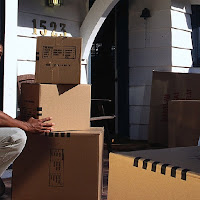
If you're planning to use a moving company, call as soon as possible. They usually need plenty of notice -- often at least six weeks or much more if you're moving a long distance.
Be sure to build in some overlap between the closing/possession date of your new home and the last day of the lease on your rental (or closing date of your current home). Moving always takes much longer than you think. If you want to make any changes to your new home -- for instance, paint walls, put in new carpeting or refinish wood floors -- plan enough time to do it BEFORE you move in so your furniture and belongings are not in the way.
Pare down your belongings. There's no sense moving things you don't need or want. Look through your house for rarely used items. Discard anything that's beyond repair, have a yard sale to get rid of the rest, and plan to load unsold merchandise into your car right away so you can take it to the charity of your choice.
Make notes about your new house -- room measurements, door measurements, location of electric/cable/phone outlets -- so you can determine exactly where your belongings will go and if they will fit through the door. Measure appliances to make sure they fit the space available.
If the previous homeowners are taking their curtains and blinds, you'll want to measure windows in places you want privacy immediately (like bedrooms and bathrooms) and buy curtains or blinds before you arrive.
Start arranging now for phone and utility hookups. They may need a few days (or even a week or more in some cases) to get you connected. Arrange now for the type of internet connection you want (if it's DSL or broadband rather than dial-up), and order extra phone jacks or cable outlets if you need them. Fill out a change of address form with the Post Office. If you have automatic debits on your bank account, alert your creditors if you're changing banks.
 Have everything you will need ready in case of an emergency or disaster.
Have everything you will need ready in case of an emergency or disaster. 
